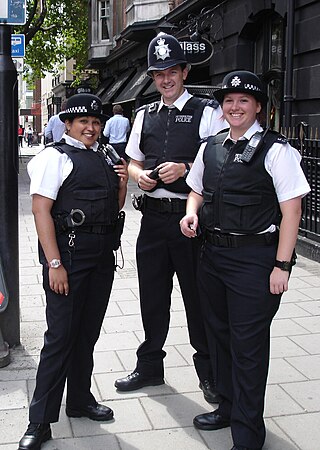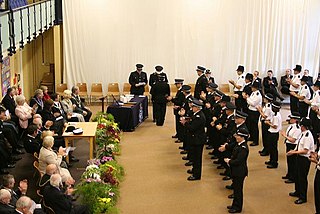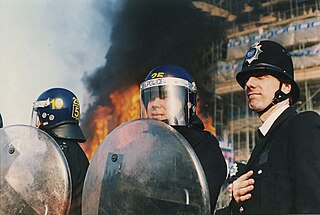
The Metropolitan Police Service (MPS), formerly and still commonly known as the Metropolitan Police, is the territorial police force responsible for law enforcement and crime prevention within Greater London. In addition, it is responsible for specialised tasks throughout the United Kingdom, such as dealing with counter-terrorism throughout the UK, and the protection of certain individuals, including the monarch, royal family, governmental officials, and other designated figures. Commonly referred to as the Met, it is also referred to as Scotland Yard or the Yard, after the location of its original headquarters in Great Scotland Yard, Whitehall in the 19th century. The Met is presently headquartered at New Scotland Yard, on the Victoria Embankment.

Law enforcement in the United Kingdom is organised separately in each of the legal systems of the United Kingdom: England and Wales, Scotland, and Northern Ireland. Most law enforcement duties are carried out by those who hold the office of police constable of a territorial police force.

A metropolitan borough is a type of local government district in England. Created in 1974 by the Local Government Act 1972, metropolitan boroughs are defined in English law as metropolitan districts within metropolitan counties. All of the metropolitan districts have been granted or regranted royal charters giving them borough status. Metropolitan boroughs have been effectively unitary authority areas since the abolition of metropolitan county councils by the Local Government Act 1985. Metropolitan boroughs pool much of their authority in joint boards and other arrangements that cover whole metropolitan counties, such as Local enterprise partnerships and Combined authorities and combined county authorities, with most of the latter having a directly elected metropolitan mayor.

Huntingdon and Peterborough was a short-lived administrative and geographical county in East Anglia in the United Kingdom. It existed from 1965 to 1974, when it became part of Cambridgeshire.

Chief Constable is the rank used by the chief police officer of every territorial police force in the United Kingdom except for the City of London Police and the Metropolitan Police, as well as the chief officers of the three 'special' national police forces, the British Transport Police, Ministry of Defence Police, and Civil Nuclear Constabulary. The title is also held by the chief officers of the principal Crown Dependency police forces and the Sovereign Base Areas Police in Cyprus. The title was also held, ex officio, by the president of the Association of Chief Police Officers under the Police Reform Act 2002. It was also the title of the chief officer of the Royal Parks Constabulary until this agency was disbanded in 2004.
Police ranks are a system of hierarchical relationships in police organisations. The rank system defines authority and responsibility in a police organisation, and affects the culture within the police force. Usually, uniforms denote the bearer's rank by particular insignia affixed to the uniforms.

The Special Constabulary is the part-time volunteer section of statutory police forces in the United Kingdom and some Crown dependencies. Its officers are known as special constables.
A Basic Command Unit (BCU) is the largest unit into which territorial British Police forces are divided BCUs may alternatively be called an Area Command or a Division.They will also contain smaller, more local teams which are often called a Local Policing Unit (LPU) or a Local Policing Team (LPT). There are 228 BCUs in England and Wales.

The poll tax riots were a series of riots in British towns and cities during protests against the Community Charge, introduced by the Conservative government of Prime Minister Margaret Thatcher. The largest protest occurred in central London on Saturday 31 March 1990, shortly before the tax was due to come into force in England and Wales.

The Police Federation of England and Wales (PFEW) is the statutory staff association for police constables, sergeants, inspectors, chief inspectors and special constables in the 43 territorial police forces in England and Wales. Under UK labour law, the police are prohibited from joining ordinary trade unions to defend pay and working conditions, by the Police Act 1996, because of the view that a police strike would pose an exceptional public safety risk. The PFEW was originally established by the Police Act 1919 as an alternative system, which would serve to represent staff, and where disputes could be resolved through arbitration so long as the government continued to bargain in good faith.

The 1918–19 British police strikes in the United Kingdom resulted in the British government putting before Parliament its proposals for a Police Act, which established the Police Federation of England and Wales and Scottish Police Federation as the representative bodies for the police. The Act barred police from belonging to a trade union or affiliating with any other trade union body. This Act, drafted and passed into law, was passed in response to the formation of the National Union of Police and Prison Officers (NUPPO). A successful police strike in 1918 and another strike in June 1919 led to the suppression of the union by the government. On 1 August 1919, the Police Act 1919 passed into law. Only token opposition from a minority of Labour Members of Parliament was voiced in Parliament.
Paul John McKeever was a British police officer. He was born in Germany and was educated at Shaftesbury School, Dorset and read geography at London University. He joined the Metropolitan Police in 1977 and led the Police Federation of England and Wales from 2008 until his death. He died of a suspected embolism and is survived by his wife Charmian and their daughter.
Sir Alexander Robertson was a British police officer. He served as Deputy Commissioner of Police of the Metropolis from 1958 to 1961.
A territorial police force is a police service that is responsible for an area defined by sub-national boundaries, distinguished from other police services which deal with the entire country or a type of crime. In countries organized as federations, police responsible for individual sub-national jurisdictions are typically called state or provincial police.
In the United Kingdom police firearm policy varies by constituent countries. In Northern Ireland, all police officers carry firearms whereas in the rest of the United Kingdom, firearms are carried only by specially-trained firearms officers.

The Police Act 1996 is an act of the Parliament of the United Kingdom which defined the current police areas in England and Wales, constituted police authorities for those areas, and set out the relationship between the Home Secretary and the English and Welsh territorial police forces. It replaced the Police and Magistrates' Courts Act 1994, which in turn had replaced the Police Act 1964.

Figures on crime in London are based primarily on two sets of statistics: the Crime Survey for England and Wales (CSEW) and police recorded crime data. Greater London is generally served by three police forces; the Metropolitan Police which is responsible for policing the vast majority of the capital, the City of London Police which is responsible for The Square Mile of the City of London and the British Transport Police, which polices the national rail network and the London Underground. A fourth police force in London, the Ministry of Defence Police, do not generally become involved with policing the general public. London also has a number of small constabularies for policing parks. Within the Home Office crime statistic publications, Greater London is referred to as the London Region.
The Constables' Central Committee is one of the tripartite organisations that make up the Police Federation of England and Wales. It is the representative body for those police officers of the rank of constable, of which there are approximately 107,000 members.
The Sheehy Inquiry, officially, the Inquiry into Police Responsibilities and Rewards, was commissioned in 1992 by the United Kingdom's then Home Secretary, Kenneth Clarke, to "examine the rank structure, remuneration, and conditions of service of the police service of England and Wales, in Scotland and in Northern Ireland," and to present recommendations if found necessary. The inquiry committee was chaired by Sir Patrick Sheehy, with members John Bullock, Professors Eric Caines and Colin Campbell, and Sir Paul Fox among the committee. The committee released its report, commonly known as the Sheehy Report, in 1993, with recommendations for significant restructuring of ranks and remuneration, detailed in seven sections in over 200 pages.
The Police Superintendents’ Association is the sole representative body for police officers in the ranks of superintendent and chief superintendent in England and Wales. Its members are the senior operational leaders in policing in the 43 Home Office forces, British Transport Police, Civil Nuclear Constabulary, Isle of Man Constabulary, the Bermuda Police Service, Royal Gibraltar Police and the Gibraltar Defence Police. The association's headquarters are in Pangbourne, Berkshire.










